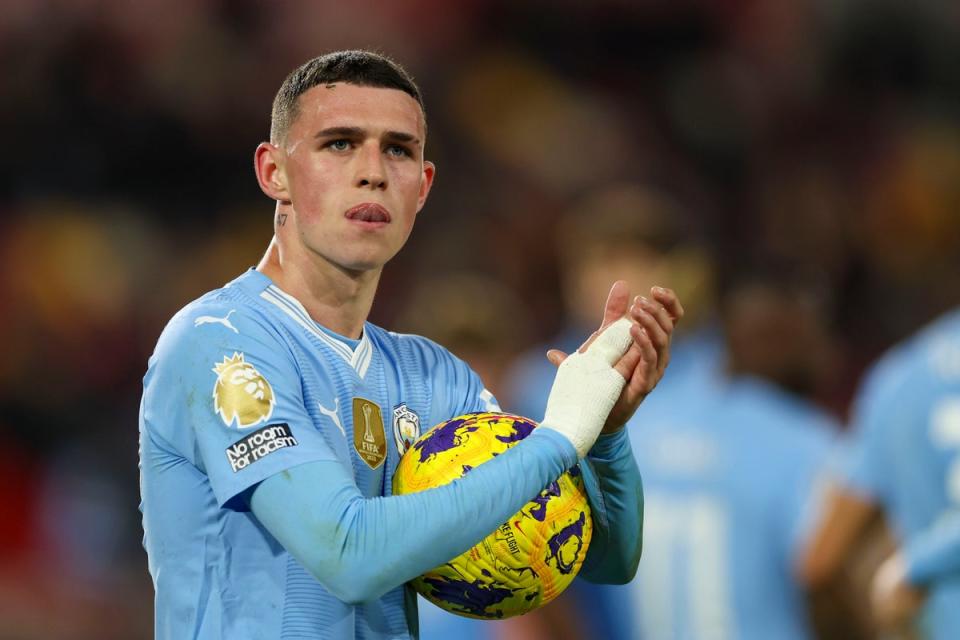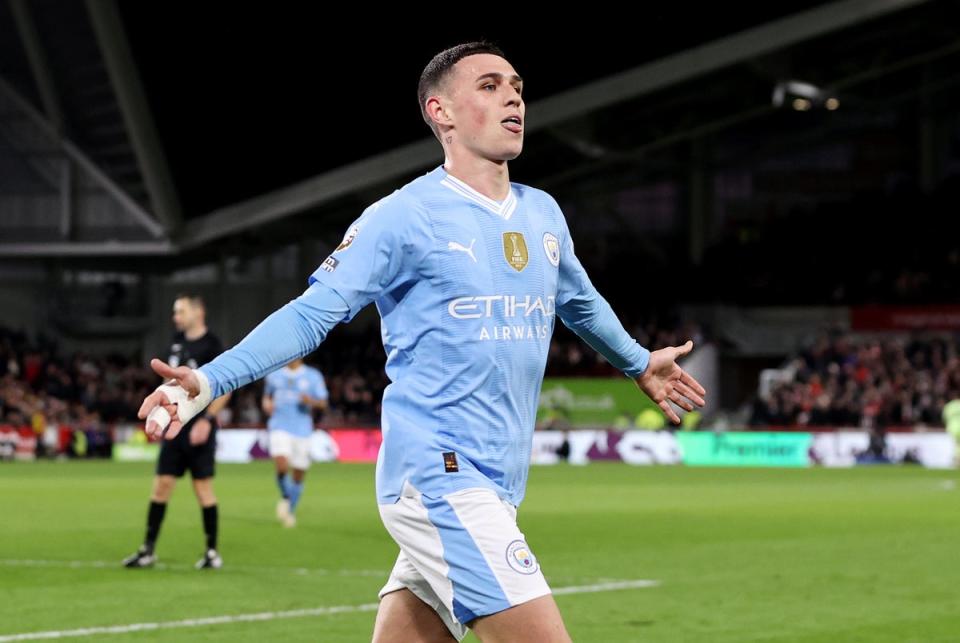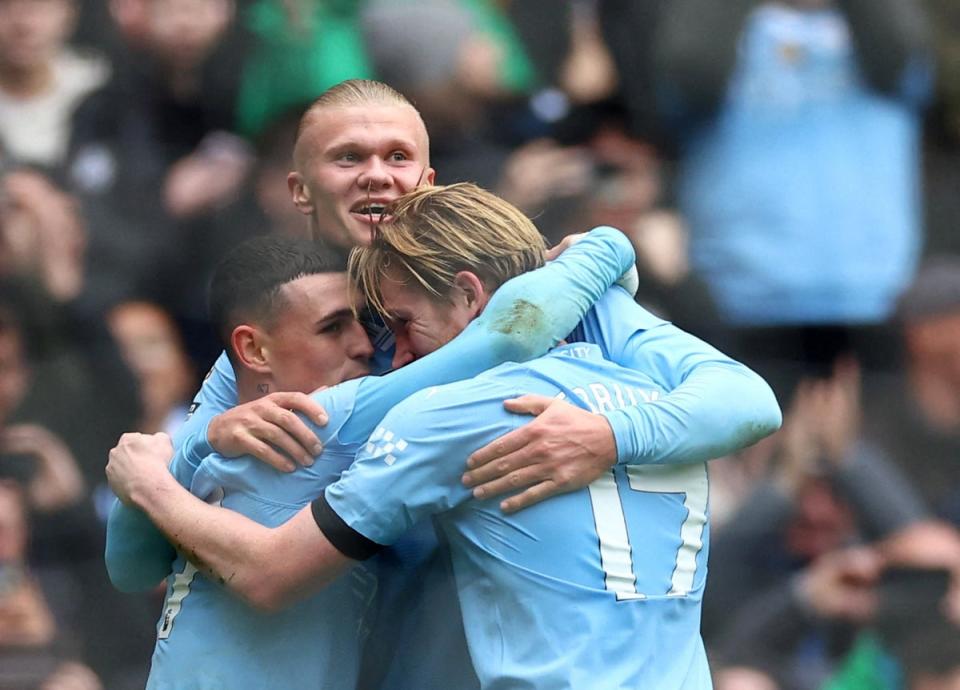How Phil Foden became Man City’s invisible, invaluable talisman

The last time Manchester United visited the Etihad Stadium, Phil Foden achieved a historic feat. He became the first player to score a hat-trick in a Manchester derby for all of nine minutes. Admittedly, until Erling Haaland had completed his own treble, no one else had mustered one in the fixture since Andrei Kanchelskis in 1994.
The last time Manchester City beat Manchester United, Foden was on target and yet overshadowed by Haaland again, scoring the third goal at Old Trafford in October. As he approaches his 12th derby – at 23, it is another indication of how Foden is amassing the numbers of a senior player while still relatively young – it is as a member of the supporting cast again.
Haaland’s five-goal extravaganza against Luton, with the first four set up by Kevin De Bruyne, was a reminder of who Manchester’s power couple are: the outstanding scorer and creator respectively in the country, each in harmony with the other, helping the other chalk up absurd numbers of goals and assists.
De Bruyne’s return has been interrupted by rests but has otherwise emphaticly underlined his primacy in Foden’s preferred position, in the centre. An increasingly regular refrain from the local (he was born in nearby Stockport and grew up a City fan) amid his midwinter excellence was a distinct preference to play in the middle.

If there has long been a narrative that City – and England – should build a team around Foden, there may be a very different counterargument: that part of his value stems from his ability to excel when filling whichever spot is vacant. He does not have De Bruyne’s passing range as a No 10 – no one else does – but he is best suited to playing there. Yet he can be a terrific right winger, left winger, false nine or attack-minded No 8. “He can play five positions,” Pep Guardiola said in 2022.
On Sunday, the likelihood is that Foden will be on the left: in part because Jack Grealish is injured, but whereas the £100m man has had an underwhelming season, Foden has had a fantastic one.
If Haaland’s two months on the sidelines disqualifies him, or if some mixed form – despite a terrific tally of 27 goals – counts against him, City’s player-of-the-year contest thus far could come down to three men: Rodri, Nathan Ake and Foden.
One of the tests of any talent is whether they can exert a consistent impact. Foden’s gifts were highlighted at an early age. He has become a more explosive player than was perhaps envisaged when he was nicknamed ‘the Stockport Iniesta’: more likely to power or dart past opponents, more of a penalty-box presence. But he has also assumed a responsibility. At times in recent years, given City’s measure of superiority in games and their number of match-winners, he has not had to be talismanic.

This season, he has been. He helped carry City through the spells without at least two, and sometimes all three, of Haaland, De Bruyne and John Stones. He goes into the reunion with United with 13 direct goal contributions in his last 13 outings; scoring nine, making four more. In the equaliser at Everton, the winner at Bournemouth, the hat-trick at Brentford, both assists against Sheffield United, a goal and an assist away at FC Copenhagen, there is a series of decisive interventions. There is a contrast with Grealish who, apart from in December, has rarely assumed such a role for winning games.
And if they are different players, with different duties, one has regressed as another has progressed. Foden has already equalled his career-best return of 16 goals in a season.
If there is a superficial similarity in his numbers for the last four campaigns – 16, 14, 15, 16 – the volume of games City have remaining and his recent form could put him on course for 25. It would be both remarkable and yet obscured by Haaland but, by way of context, only four Premier League players reached 25 goals in all competitions last season: the Norwegian, Harry Kane, Marcus Rashford and Mohamed Salah. Two were invariably deployed as centre-forwards, the other pair their respective sides’ main scorer. None was required to show Foden’s versatility.

For now, however, it may benefit Foden if he no longer appears the main threat in his team. United may be wary of several specialists in this fixture: Haaland already has five goals and, assuming he stays at City long enough, should break Wayne Rooney’s record of 11 Manchester derby goals, De Bruyne has five assists against United in Erik ten Hag’s reign already and Bernardo Silva has a history of hugely influential performances in all-Mancunian affairs.
Foden has played in an era when City expect to win most of them; his personal return stands at eight victories in 11 attempts, aided by a couple of late cameos in his younger days.
Then there was always the question if a prodigy would get enough chances, if he should leave. Now he is past 250 appearances for City and a deluxe, destructive utility player. And if part of that job description is imperfect for him, it makes him invaluable to Guardiola.

 Yahoo Sport
Yahoo Sport 



































































